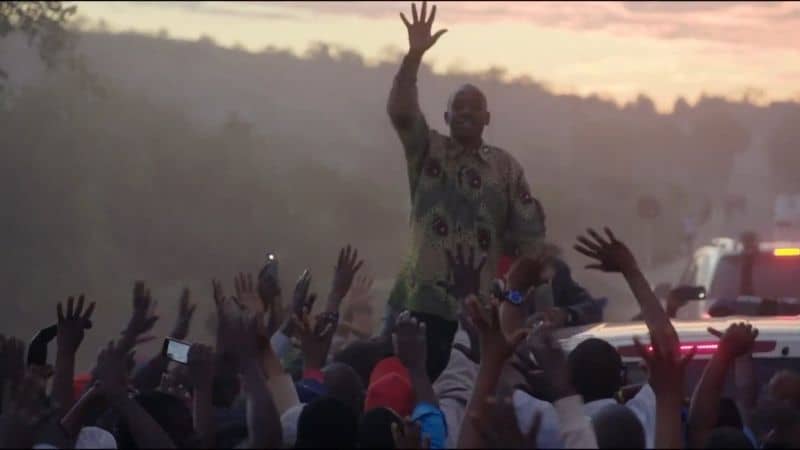In 2017 Robert Mugabe, the longtime dictator of Zimbabwe, was removed from power. A sigh of relief was heard coming from many observers, and there was real hope for freedom and democracy making its way into another African country.
The year after, in July 2018, elections were called to continue the process towards a truly democratic society. One presidential candidate was Emmerson Dambudzo Mnangagwa that served as Mugabe’s close advisor and vice-president and represented the same ZANU-PF party. Still, there were several other able and qualified candidates for the top post. The 2018 elections had the potential to become the test trial for the new democracy, and obviously, the event attracted a lot of international interest.
Among the observers was Danish screenwriter and director Camilla Nielsson. She went to Zimbabwe to witness the country’s first «fair» election, and now her documentary on the event has been released. That has become a captivating story of crushed hopes.

Up against dark forces
The film’s main character is Nelson Chamisa, a 40 years old lawyer from Harare running a dynamic and highly efficient campaign. Chamisa is convinced that his country is on the brink of economic and humanitarian disaster. Corruption and mismanagement are rampant, and ordinary people suffer.
«Nothing has changed, Mnangagwa is selling the international community of the world a dumb and a ruse. He has been part of Mugabe for 56 years, and he was his advisor for 37 years. They have been partners in the destruction of this country», we hear him say early in the film.
Things look promising. Chamisa has a lot of energy, and this seemingly soft-spoken and gentle man has a lot of charisma. He attends election rallies, where thousands greet him with jubilant cheers and open palms – his movement’s symbol of a new and open society. Nelson Chamisa did not expect to kick-start his political career this was. His party, the Movement for Democratic Change, was headed by Morgan Tsvangirai, but he died five months before election day, and someone had to take over.
Corruption and mismanagement are rampant, and ordinary people suffer.
What looks like a classic suspense build-up belongs to a very real and cruel world, though, and the sympathetic newcomer is presented with almost insurmountable odds. Polls look promising, and victory seems close, but Chamisa and his team is up against dark forces. Things get ugly right in front of Nielsson’s camera. It starts with minor incidents and suspicions, but things quickly turn from bad to much worse. There seems to be illegal printing of ballots. Chamisa and his people are surrounded by people that are determined to frustrate them. To force them to give up. Justice Chigumba, who is heading the national election commission, seems to have no intention to help – she is far too close to the old system.
On election day, things get out of hand. Demonstrations and protests are met with brute power, and six people are killed in the streets of Harare. There is no doubt that democracy has been lost.
Afterwards, international observers are collecting affidavits on how people at the polling stations were threatened. There are countless signs of grave vote-rigging. In one place, Mnangagwa got more than twice the number of registered votes. They find evidence that votes were stolen and figures inflated. In some rural districts, local chiefs told people that if they did not vote for Mnangagwa, they would not get food. In 16 districts, the vote counts were identical. High profile lawyers arrive from South Africa, including Jeremy Gauntlett, who represented the late President Nelson Mandela. Their presence in the courtroom is denied, and the only hope is with the justice minister close to Mnangagwa.
Nothing helps, and in the end, the judges declare Mnangagwa, the rightful winner. Despite massive evidence of the opposite.

Unforgettable shots
The film is a meticulous documentation of a truly disappointing test for democracy. That is of great value, especially considering the high expectations of the Zimbabwean case. To this day, Mnangagwa is residing in the presidential palace of Harare, while Nelson Chamisa is still a struggling opposition figure.
Earlier this year, the film won the Special Jury Award for Verité Film Making at the Sundance Festival, and that is well deserved. This filmmaker had the sense of being at the right place at the right moment. There are many unforgettable shots, and the film stands out as an intelligent illustration of things going terribly wrong in a most important process towards democracy.
The material is vast, which might explain the length of the film. It is a long documentary at almost two hours, and it might have served it well to make the film a bit shorter. But that being said, President still stands out as a remarkable piece of investigative filmmaking.



